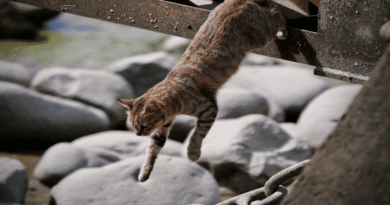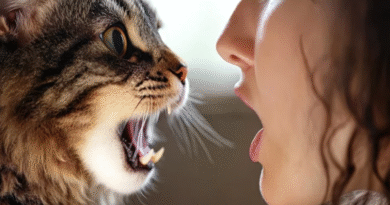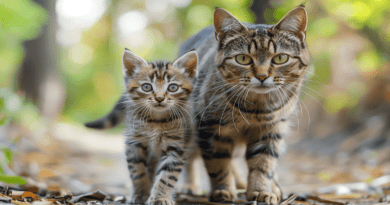Cats May Learn Words Faster Than Human Babies
Cats may not just be excellent listeners; recent research suggests they could be mastering words at a speed that rivals or even surpasses that of human infants. While many assume dogs hold the crown in understanding human language, studies show that cats are also quick learners. Through repeated exposure and positive reinforcement, cats appear capable of identifying and responding to specific words, names, and even commands. These findings shed light on a surprising aspect of feline intelligence that challenges conventional beliefs about our independent, sometimes aloof, companions.
How Cats Learn Words So Quickly
Researchers discovered that cats develop an understanding of words through consistent interactions with their owners. Just as babies begin to recognize words by associating them with objects or actions, cats link words to rewards, objects, or particular interactions. The study highlights that familiar words, especially those associated with positive outcomes like treats, toys, or affection, resonate strongly with cats. Unlike human infants, who need extensive time and repetition, cats quickly connect words with actions or objects, showcasing a powerful learning capability.
This rapid word association may occur because cats are highly attuned to their owners’ voices, tone, and body language. Cats often rely on these signals to interpret their environment. In a sense, cats learn words because they tune into how their humans use them consistently. So, when you repeatedly call your cat by name or mention a favorite toy, your cat begins to associate these sounds with specific meanings and responses.
The Role of Context in Feline Vocabulary
Cats don’t only rely on words alone—they also rely heavily on context. For instance, if a cat hears its name in the context of feeding time or play, it starts connecting that sound with food or activity. Cats learn the “what” and “when” of words in their daily routines, which further strengthens their understanding. A word like “treat” may elicit an immediate response because the cat knows it will receive something enjoyable. These associations create a framework for understanding, allowing cats to react quickly to familiar words and phrases.
Interestingly, the study reveals that cats learn these associations faster than human infants. While human babies take longer to grasp language complexities, cats rely on simpler, more direct associations that build their vocabulary. Cats also appear to recognize words associated with daily routines or favorite people faster than other animals might. This quick learning aligns with their keen senses and their natural instincts as hunters, where sharp observation and fast responses are essential.
The Importance of Tone and Repetition
Cats respond better to words spoken with specific tones. In fact, the tone often becomes as meaningful as the word itself. For example, a high-pitched, affectionate tone may signal something positive, prompting a quick response. Repeated exposure to the same tone and words reinforces these connections, solidifying the association in the cat’s mind.
Researchers also found that frequent repetition significantly boosts cats’ ability to remember words. When owners use consistent vocabulary and repeat specific terms, cats learn and retain them with ease. This pattern of repeated association strengthens the word’s meaning in a cat’s daily life, enhancing both learning speed and retention.
The Role of Rewards in Language Learning
Cats are highly motivated by rewards, which play a crucial role in language learning. Cats don’t respond to words simply out of curiosity; they react because they expect a reward. Whether it’s a treat, petting, or playtime, cats learn that certain words bring specific outcomes. This expectation keeps them alert and responsive, reinforcing the association.
For example, when a cat hears its name called before receiving a meal, it learns to associate its name with food. Over time, these positive reinforcements build a bank of words the cat understands and expects, enhancing its vocabulary.
Surprising Findings: How Feline Intelligence Surpasses Expectations
While cats may seem aloof compared to other pets, their ability to understand words showcases a new level of intelligence. Cats often show a preference for their owner’s voice, further boosting their word-learning abilities. Unlike dogs, who often respond to commands, cats appear to interpret words in a way that suits their independent nature. This unique approach to language may contribute to their quick learning pace.
The study’s findings challenge assumptions that cats lack social intelligence or attachment to humans. In reality, cats may listen intently, discerning familiar phrases that help them understand the world. As researchers uncover more about feline intelligence, cats are likely to receive newfound appreciation for their social and cognitive skills.
Conclusion: A New Look at Cats’ Language Abilities
Cats’ impressive learning abilities reveal just how attuned they are to human words, tone, and interaction. Through repeated exposure and reward-based associations, cats can grasp a rich vocabulary, sometimes at a speed that surpasses human infants. With these findings, it becomes clear that cats offer more than companionship—they may also have a silent, but sharp, understanding of the language we use with them. So, next time you call your cat, remember they might be picking up far more than you realize.
As this research continues, it opens doors to understanding and deepening the bonds we share with cats. This remarkable capacity to learn words fast reveals another layer of their intelligence, giving us a fresh appreciation for these complex, clever companions.
For more reading to enrich your understanding about cat language abilities ,please check the suggested links below :
1-https://www.earth.com/news/cats-can-associate-human-words-with-images/
2-https://www.kinship.com/cat-behavior/cats-associate-words-with-images-study-news







